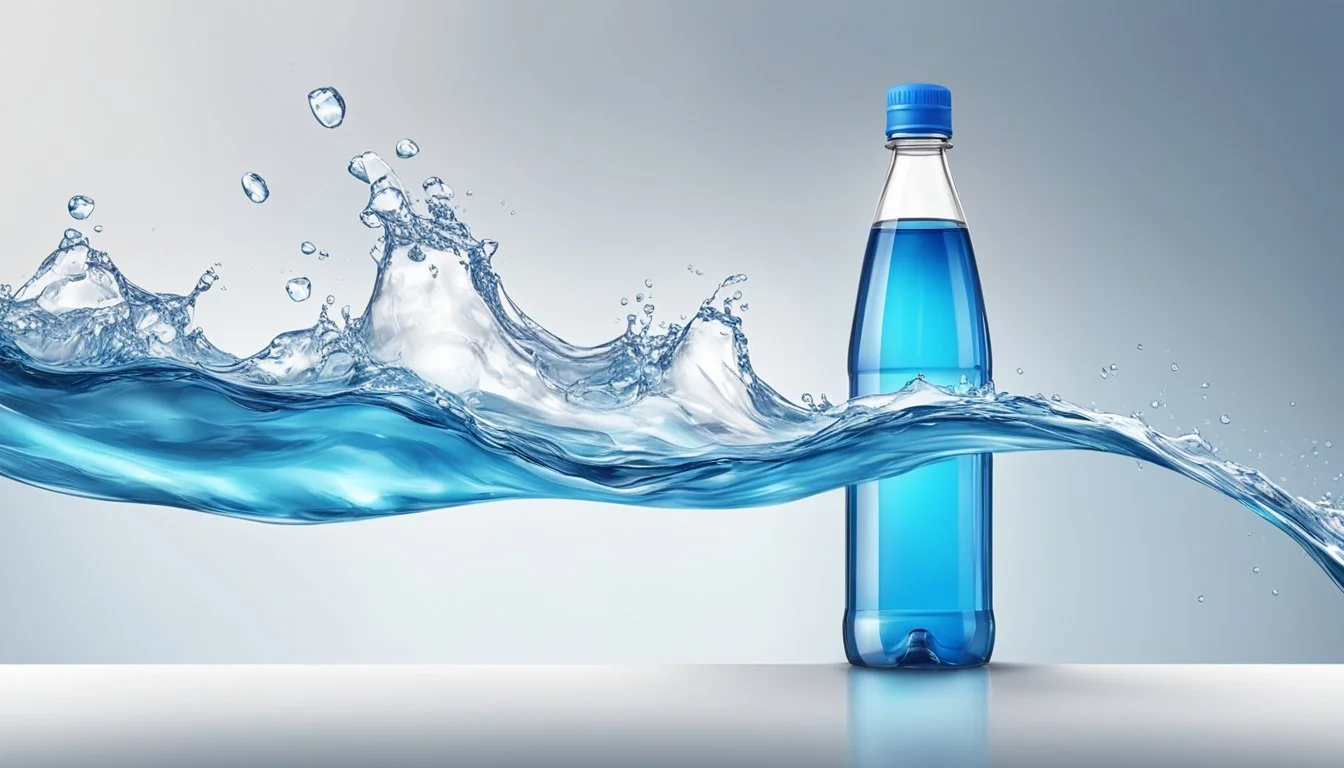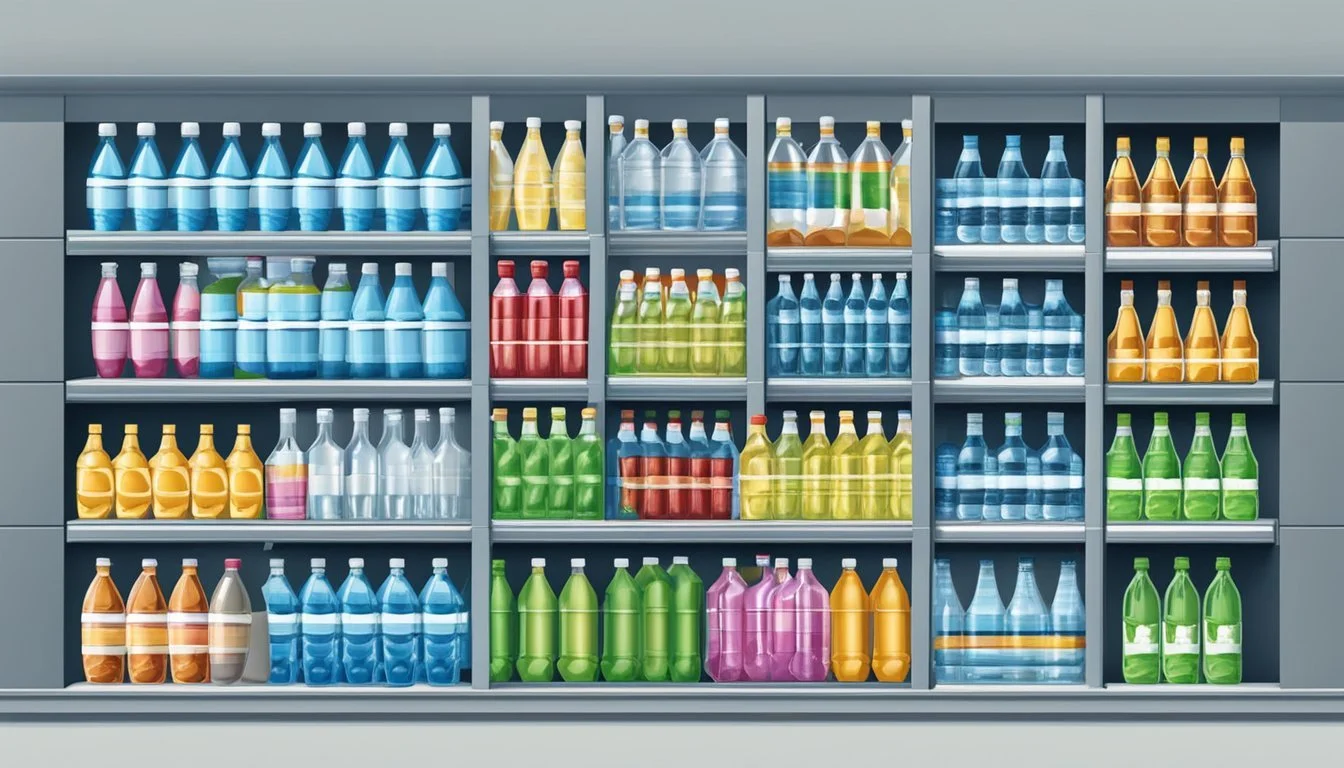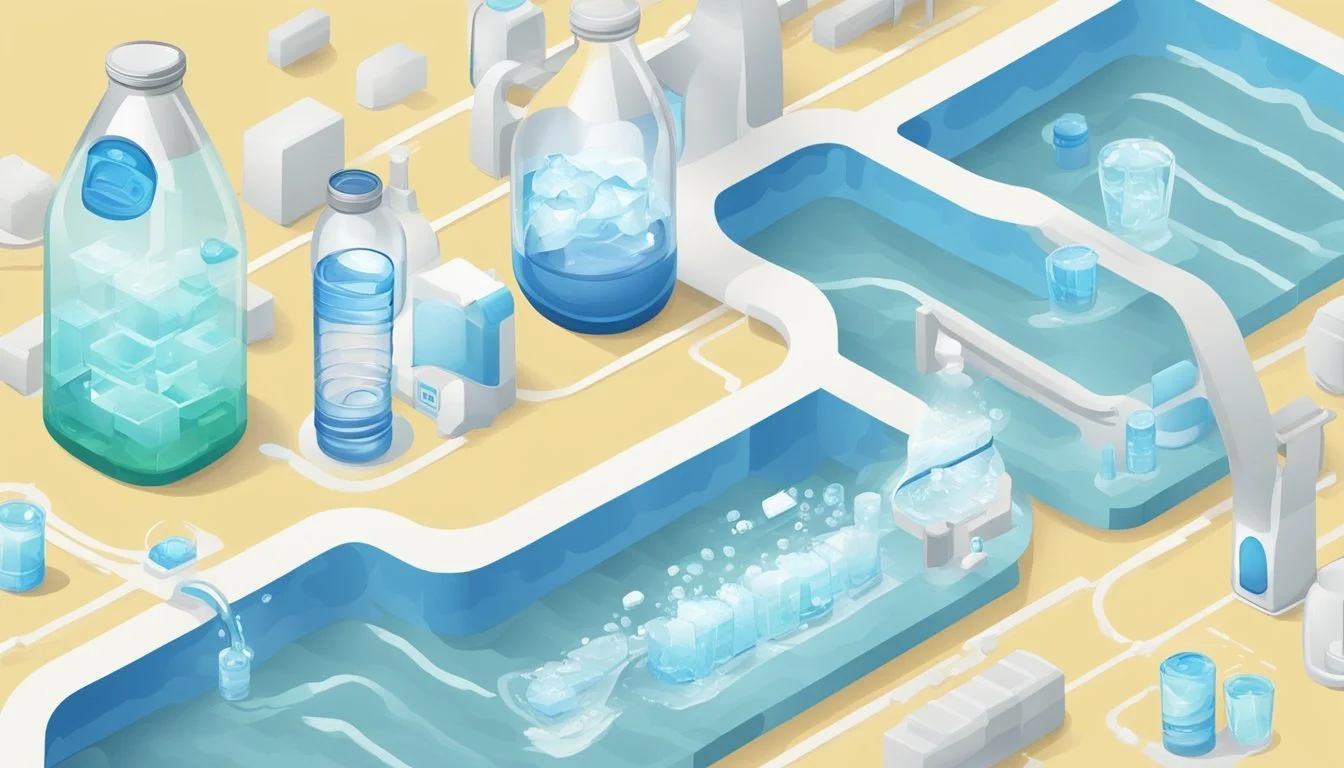Is Flow the Best Bottled Water?
The Clear Choice for Hydration
Flow bottled water offers a unique approach to hydration and wellness. Sourced from artesian springs, this naturally alkaline water contains essential minerals and electrolytes that support the body's needs. Flow water is packaged in eco-friendly containers, addressing environmental concerns while providing a smooth, clean taste.
The brand's commitment to sustainability stems from its founder's experience at Burning Man in 2015. Witnessing the waste generated by plastic water bottles, Nicholas Reichenbach set out to create a more environmentally responsible alternative. This led to the development of Flow's distinctive packaging and sourcing methods.
Flow water aims to elevate daily hydration routines. Its natural composition and alkaline properties appeal to health-conscious consumers seeking more than basic hydration. The brand emphasizes the importance of quality water in supporting overall wellness and preparing individuals for their daily challenges.
The Essentials of Flow Bottled Water
Flow bottled water offers naturally alkaline spring water with essential minerals and electrolytes. The brand emphasizes sustainability and health benefits through its unique sourcing and packaging.
Understanding the Brand
Flow was founded with a focus on providing natural spring water without plastic bottles. The company sources its water from artesian springs in Canada. As a Certified B Corporation, Flow adheres to high social and environmental standards.
Flow has experienced rapid growth since its inception. The brand's commitment to sustainability extends beyond just water, influencing its packaging choices and overall business practices.
Defining Natural Alkaline Spring Water
Flow water has a natural alkaline pH of 8.1. This level is believed to support optimal hydration and may aid in digestion. The water contains natural electrolytes and essential minerals like calcium, potassium, magnesium, and bicarbonate.
These minerals contribute to the water's alkaline nature and provide potential health benefits. Flow's spring water is untreated, maintaining its natural composition from the source.
Unique Features of Flow Water
Flow's packaging sets it apart from traditional bottled water. The containers are made from 68-75% renewable, plant-based materials. This eco-friendly packaging is 100% recyclable, aligning with the brand's sustainability goals.
The water itself is rich in natural electrolytes, offering enhanced hydration. Flow emphasizes the absence of additives or artificial processes in their water production.
The brand aims to provide a clean, refreshing taste while maintaining environmental responsibility. Flow continues to innovate, working towards 100% renewable packaging materials in the future.
Health and Wellness Benefits
Flow bottled water offers several advantages for those seeking to enhance their well-being. Its unique properties and composition contribute to improved hydration and overall wellness.
Alkaline Water and Hydration
Flow water's naturally alkaline pH level may help balance the body's acidity. This can potentially support better hydration by allowing cells to absorb water more efficiently. The higher pH might also assist in neutralizing excess acid in the body, which could aid digestion and reduce inflammation.
Some studies suggest alkaline water may improve exercise performance and recovery. It could help athletes maintain proper hydration levels during intense physical activities. The water's structure may allow for quicker absorption, providing faster hydration to muscles and organs.
Mineral Content and its Advantages
Flow water contains naturally occurring minerals that can contribute to daily nutrient intake. These include calcium, magnesium, and potassium. Calcium supports bone health and muscle function. Magnesium plays a role in energy production and nerve function.
Potassium is crucial for maintaining proper fluid balance and supporting heart health. The mineral content in Flow water may help replenish electrolytes lost through sweat or physical activity. This can be particularly beneficial for active individuals or those living in hot climates.
Vitamin-Infused Varieties
Flow offers vitamin-infused water options that provide additional health benefits. These varieties contain added vitamin C, which supports immune function and acts as an antioxidant. Vitamin C also aids in collagen production, promoting skin health.
The vitamin-infused options maintain Flow's commitment to zero sugar, making them a healthier alternative to many flavored beverages. They offer a way to increase vitamin intake without added calories or artificial sweeteners. These varieties can be particularly appealing to those looking to boost their vitamin C consumption while staying hydrated.
Eco-Conscious Packaging and Sustainability
Flow bottled water stands out for its commitment to environmentally responsible packaging and sustainable practices. The brand prioritizes reducing its environmental impact through innovative materials and conscious production methods.
Sustainability Promise and Practices
Flow's sustainability promise centers on minimizing its carbon footprint and promoting eco-friendly practices. The company utilizes a spring water source that naturally replenishes, ensuring long-term sustainability. Flow has obtained B Corp Certification, demonstrating its dedication to balancing profit with purpose.
The brand implements water stewardship practices to protect its spring water source. Flow also focuses on renewable energy usage in its production processes. These efforts contribute to reducing the overall environmental impact of bottled water production.
Plant-Based Cap and Recyclable Materials
Flow's packaging innovation includes a plant-based cap made from sugarcane. This renewable resource helps decrease reliance on fossil fuel-based plastics. The bottle itself is composed of 68-75% renewable materials, primarily derived from plants.
The packaging is 100% recyclable, encouraging proper disposal and reuse of materials. Flow's choice of materials significantly reduces the environmental footprint compared to traditional plastic bottles. The brand continually researches and develops new sustainable packaging solutions to further improve its eco-friendliness.
Addressing the Plastic Waste Challenge
Flow directly tackles the issue of plastic waste by offering an alternative to conventional plastic bottles. The company's packaging is designed to be kinder to the planet while still providing convenience to consumers.
By using renewable and recyclable materials, Flow helps reduce the amount of plastic ending up in landfills and oceans. The brand's efforts align with growing consumer demand for sustainable packaging options in the bottled water industry.
Flow actively promotes recycling education and awareness to ensure its packaging is properly disposed of and recycled. This comprehensive approach aims to create a positive ripple effect in addressing the global plastic waste challenge.
Product Range and Flavors
Flow offers a diverse selection of naturally flavored alkaline spring waters. The brand focuses on unique flavor combinations and organic ingredients to provide refreshing options without added sugars or calories.
Natural Flavor Offerings
Flow's core product line features several enticing flavor combinations. Cucumber + Mint provides a cool, crisp taste. Peach + Blueberry blends sweet and tangy fruit notes. Strawberry + Rose offers a delicate floral twist. These flavors are infused with organic ingredients, maintaining Flow's commitment to quality and natural sourcing.
Each flavor is available in 500ml bottles, perfect for on-the-go hydration. The waters contain naturally occurring electrolytes like potassium and calcium, supporting replenishment and overall wellness.
Special Editions and Variety Packs
Flow caters to different consumer preferences with special edition flavors and convenient multi-packs. The brand offers 12-packs of 500ml bottles in popular flavors like Cucumber + Mint, Peach + Blueberry, and Strawberry + Rose.
For those who can't decide on a single flavor, Flow provides variety packs. These assortments allow customers to sample multiple flavors in one purchase. The brand's "Best Sellers" pack typically includes a mix of their most popular options.
Flow occasionally introduces limited-time flavors to keep their product range exciting and fresh. These special editions often feature seasonal ingredients or unique flavor combinations, giving customers new tastes to explore.
Market Position and Consumer Recognition
Flow bottled water has established itself as a notable player in the competitive bottled water industry. Its unique attributes and marketing approach have shaped its market position and consumer perception.
Brand Trust and Customer Loyalty
Flow has cultivated a strong brand image centered on sustainability and health-consciousness. The company's use of renewable packaging materials appeals to environmentally aware consumers. Flow's alkaline spring water, sourced from natural springs, resonates with health-focused individuals seeking enhanced hydration.
Customer loyalty to Flow stems from its perceived premium quality and eco-friendly practices. The brand's distinctive boxed water design sets it apart visually on store shelves, aiding recognition. Flow's marketing emphasizes purity and sustainability, which aligns with growing consumer preferences for responsible brands.
Comparisons with Competing Brands
Flow positions itself as a premium alternative to mainstream bottled water brands like Dasani and Aquafina. Unlike these mass-market options, Flow targets consumers willing to pay more for perceived health benefits and environmental responsibility.
In comparison to Evian, another premium water brand, Flow differentiates itself through its alkaline properties and unique packaging. While Evian relies on its longstanding reputation and natural mineral content, Flow emphasizes innovation in both product and packaging.
Flow's market share, though growing, remains smaller than industry giants. However, its niche positioning allows for higher profit margins and a loyal customer base. The brand continues to expand its presence in health food stores and upscale retailers, carving out a distinct space in the bottled water market.
Analyzing the Costs and Subscription Options
Flow bottled water offers various pricing strategies and subscription services to meet consumer needs. These options provide flexibility and convenience for customers while aiming to maximize value.
Understanding Pricing Strategy
Flow bottled water typically employs a tiered pricing structure. Single bottles may retail for $2-$3, while multi-packs offer savings through bulk purchasing. A 12-pack often costs $20-$25, reducing the per-unit price to around $1.70-$2.10 per bottle.
Promotional sales and discounts are common, with retailers offering 10-20% off regular prices during certain periods. Some stores provide loyalty programs, allowing customers to earn points or receive exclusive deals on Flow products.
Unit pricing is crucial for comparison shopping. Flow bottles usually contain 500mL or 1L, so consumers should calculate cost per liter when evaluating different sizes or brands.
Convenience of Subscription Services
Flow's subscription model provides a hassle-free way to maintain a steady supply of water. Customers can choose delivery frequencies, typically ranging from weekly to monthly.
Subscriptions often come with perks like free shipping, guaranteed lowest prices, and the ability to pause or cancel anytime. A typical monthly subscription for 24 bottles might cost $40-$50, offering savings compared to individual purchases.
The convenience factor is significant. Subscribers don't need to remember to reorder or carry heavy cases from stores. This service is particularly appealing for regular consumers, offices, or households with high water consumption.
Environmental and Health Standards
Flow bottled water adheres to strict environmental and health standards set by regulatory bodies. These standards ensure the safety and quality of bottled water for consumers while minimizing environmental impacts.
Compliance with Regulations
Flow bottled water complies with regulations set by the U.S. Environmental Protection Agency (EPA) and the Food and Drug Administration (FDA). The EPA establishes standards for public drinking water, which bottled water must meet or exceed. The FDA regulates bottled water as a food product, enforcing strict quality and safety requirements.
The International Bottled Water Association (IBWA) also sets industry standards that many companies follow voluntarily. These standards often surpass government regulations, covering areas such as water source protection, production processes, and quality testing.
Bottled water companies must regularly test their products for contaminants and provide quality reports to regulatory agencies. This ensures ongoing compliance with health and safety standards.
Meeting Quality and Safety Expectations
Flow bottled water undergoes rigorous treatment processes to meet quality and safety expectations. Common methods include:
Reverse osmosis
Ozonation
UV light treatment
Carbon filtration
These processes remove contaminants, microbes, and impurities, producing clean, safe drinking water. Regular testing verifies the effectiveness of these treatments.
Bottled water companies must also ensure proper packaging and storage to maintain water quality. This includes using food-grade materials and implementing strict hygiene practices during production and bottling.
Consumers can access information about water sources, treatment methods, and quality testing results. This transparency helps build trust and allows consumers to make informed choices about their bottled water.
Comparison with Tap and Other Bottled Waters
Flow bottled water differs from tap water and other bottled options in several key areas. These include water sources, purification methods, and added minerals or pH levels.
Bottled Water Versus Municipal Tap Water
Flow bottled water comes from natural springs, while tap water originates from various sources like rivers, lakes, or groundwater. Municipal tap water undergoes treatment to meet safety standards, but may contain trace contaminants.
Bottled water often undergoes additional purification processes. This can result in fewer contaminants compared to tap water in some cases. However, well-maintained municipal water systems can provide equally safe and often more affordable drinking water.
Tap water quality varies by location. Some areas have excellent tap water, while others may face challenges with aging infrastructure or contamination risks. Consumers can access water quality reports from their local utilities to make informed decisions.
Analyzing Different Water Purification Methods
Flow bottled water utilizes multiple purification steps. These may include reverse osmosis, UV light treatment, and carbon filtration.
Reverse osmosis removes a wide range of contaminants by forcing water through a semipermeable membrane. This process effectively eliminates many dissolved solids, but also removes beneficial minerals.
UV light treatment destroys harmful microorganisms without adding chemicals. Carbon filtration absorbs chlorine, organic compounds, and some heavy metals, improving taste and odor.
Other bottled water brands may use similar methods or opt for different approaches like distillation or ozonation. Each method has its strengths and limitations in terms of contaminant removal and mineral retention.
Alkaline Water in Comparison to Other Bottled Waters
Flow bottled water is alkaline, with a pH above 7. This sets it apart from many other bottled waters, which are often neutral or slightly acidic.
Alkaline water proponents claim potential health benefits, such as improved hydration and acid-reflux relief. However, scientific evidence supporting these claims remains limited.
Some alkaline waters achieve their higher pH through natural mineral content. Others use artificial processes to increase alkalinity. Flow water's alkalinity comes from its natural spring source.
Not all bottled waters are alkaline. Many popular brands offer neutral pH water. Some specialty waters focus on mineral content or electrolyte balance rather than pH levels.









